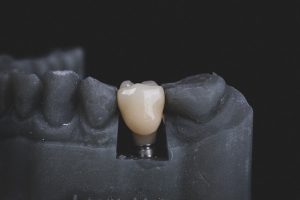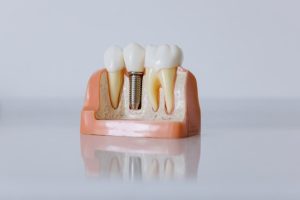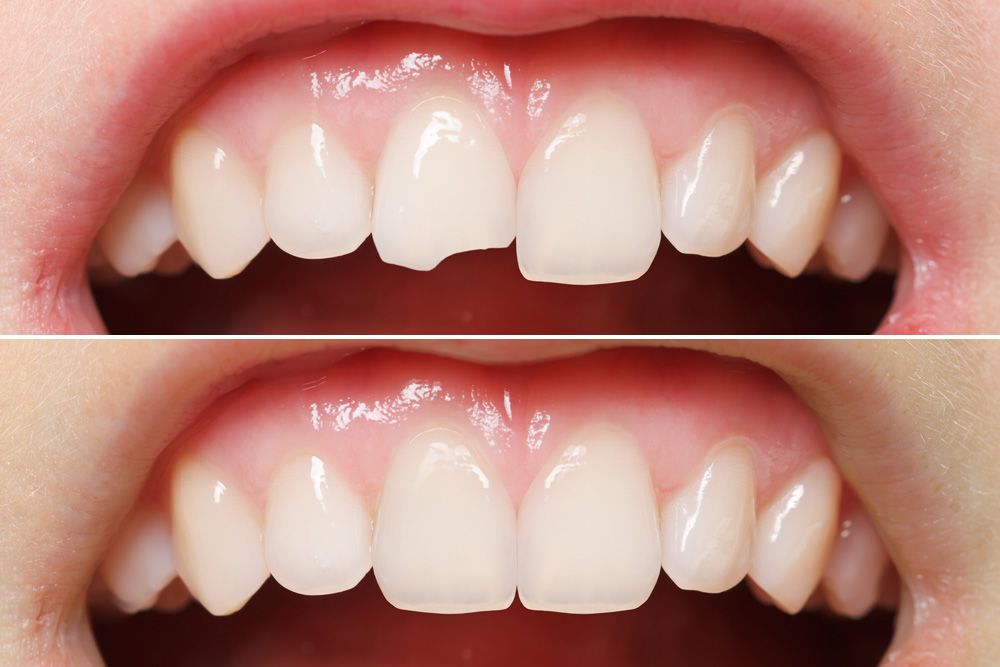
In the realm of modern dentistry, dental implants have revolutionized the way we approach tooth replacement. Gone are the days when traditional bridges or dentures were the primary options. Dental implants offer a durable and natural-looking solution for those seeking to restore their smiles and oral functionality. In this comprehensive guide, we will explore what dental implants are, the benefits they offer, the implant procedure, aftercare, and who can benefit from this remarkable dental advancement.
[ez-toc]
Also Read: Dental Bridge: Bridging the Gap to a Confident Smile
Understanding Dental Implants
What Are Dental Implants? Dental implants are artificial tooth roots made of titanium that are surgically placed into the jawbone beneath the gum line. Once in place, they provide a sturdy foundation for attaching replacement teeth, such as crowns, bridges, or dentures. The result is a natural-looking and functional tooth replacement that can last a lifetime.
Components of a Dental Implant:
- Implant Fixture: The titanium post that is surgically inserted into the jawbone.
- Abutment: The connector that supports and holds the crown or artificial tooth.
- Crown: The prosthetic tooth that sits on top of the abutment, mimicking a natural tooth.
What Do Dental Implants Look Like

Dental implants are designed to closely resemble natural teeth in both appearance and functionality. They are carefully crafted to ensure a seamless blend with the surrounding teeth and a natural smile.
When is it too Late to Get Dental Implants
It’s not necessarily “too late” to get dental implants at a specific age, but there are certain considerations and factors that may affect the suitability and success of dental implants for an individual. Dental implants can be placed at various stages of life, from young adulthood to older age, as long as the individual is in good health and has adequate bone density in the jaw.
Here are some considerations regarding the timing and suitability of dental implants:
Bone Health:
Adequate bone density in the jaw is essential for the successful placement and stability of dental implants. If an individual has experienced significant bone loss, they may require bone grafting or other procedures to build up the bone before implants can be placed.
Health Conditions:
Overall health is a critical factor. Patients with certain uncontrolled medical conditions, such as uncontrolled diabetes or active gum disease, may need to manage these conditions before undergoing implant surgery.
Smoking and Tobacco Use:
Smoking and tobacco use can significantly affect the success of dental implants. It’s advisable to quit smoking or using tobacco before undergoing implant surgery to enhance the chances of a successful outcome.
Oral Health:
Good oral health and hygiene are crucial for the success of dental implants. Candidates should have healthy gums and a commitment to maintaining proper oral hygiene.
Age:
While there is no specific age limit for dental implants, older individuals may face challenges related to bone density and healing. However, many elderly individuals successfully receive dental implants.
Individual Health Assessment:
Each person is unique, and the decision to get dental implants should be based on a thorough assessment by a dental professional considering the individual’s overall health, oral health, and specific circumstances.
Consultation with a Dental Professional:
If you’re considering dental implants, consult with an oral surgeon or a qualified dental implant specialist for a comprehensive evaluation and to discuss your options.
Ultimately, the decision to get dental implants is based on an individual’s health, oral condition, and preferences. Advanced age alone is not a barrier to getting dental implants, but a thorough evaluation and discussion with a dental professional will help determine the best course of action based on your specific situation.
The Benefits of Dental Implants
Natural Appearance and Functionality:
Dental implants look, feel, and function like natural teeth, providing a seamless and aesthetically pleasing smile.
Longevity:
With proper care, dental implants can last a lifetime, making them a cost-effective solution in the long run.
Improved Oral Health:
Unlike traditional bridges, dental implants do not require reducing nearby teeth. This preserves the integrity of your natural teeth.
Enhanced Speech and Comfort:
Dental implants eliminate the discomfort and inconvenience associated with removable dentures, improving speech and comfort.
Bone Health Preservation:
Implants stimulate bone growth, preventing bone loss and maintaining facial structure.
High Success Rate:
Dental implants have a success rate of about 95-98%, making them a reliable and effective treatment option.
The Dental Implant Procedure
Consultation and Treatment Planning:
The dentist conducts a thorough examination, discusses your medical history, and develops a personalized treatment plan.
Implant Placement:
The implant fixture is surgically placed into the jawbone, and the gum is stitched over the implant.
Osseointegration:
Over a few months, the implant fuses with the jawbone in a process called osseointegration, providing a strong foundation.
Abutment Placement:
After osseointegration, an abutment is attached to the implant, protruding above the gumline to connect the crown.
Crown Attachment:
The final step involves attaching a custom-made crown to the abutment, completing the implant.
Aftercare and Maintenance
- Oral Hygiene:
Maintain regular oral hygiene by brushing, flossing, and using an antibacterial mouthwash to keep the implant and surrounding teeth clean. - Regular Dental Check-ups:
Visit your dentist for routine check-ups and cleanings to monitor the health of your implants and overall oral health. - Avoiding Damaging Habits:
Refrain from chewing on hard objects, grinding teeth, or using tobacco products to prevent damage to the implant.
Who Can Benefit from Dental Implants?
Dental implants are a viable solution for individuals who:
- Have missing teeth due to injury, decay, or congenital issues.
- Desire a more permanent and natural-looking alternative to traditional dentures.
- Have sufficient bone density to support the implant or are eligible for bone grafting procedures.
Why No Dairy After Dental Implant
After a dental implant procedure, it’s generally advisable to avoid certain foods, including dairy products, for a short period. This precaution is mainly to ensure proper healing and reduce the risk of complications. Here’s why dairy may be restricted temporarily after a dental implant:
- Risk of Infection: In the immediate post-operative period, there’s a heightened risk of infection at the surgical site. Dairy products can sometimes contain bacteria, and it’s important to minimize the risk of introducing any potential pathogens into the healing area.
- Avoiding Discomfort: Dairy products can be cold or have a creamy consistency, which might cause discomfort or sensitivity, especially in the initial days after surgery when the surgical site may still be sensitive.
- Soft Diet Preference: After a dental implant, it’s often recommended to stick to a soft diet initially to minimize chewing or biting on the surgical site. Dairy products like yogurt or cheese, while soft, may not be ideal due to the reasons mentioned above.
- Medication Interactions: Patients may be prescribed antibiotics or other medications following the dental implant surgery. Some dairy products can interfere with the absorption or effectiveness of certain medications, so it’s best to avoid any potential interactions.
However, it’s essential to follow the specific post-operative instructions provided by your oral surgeon or dentist. If they advise against dairy or any other foods, it’s crucial to adhere to these recommendations to support proper healing and minimize the risk of complications. As healing progresses and any potential infection risk subsides, you can gradually reintroduce dairy products into your diet as recommended by your dental professional. Always consult your dentist or oral surgeon if you have any questions or concerns about your post-operative diet.
How Long Does A Dental Cleaning Take?
A typical dental cleaning, also known as dental prophylaxis, usually takes between 30 minutes to 1 hour. However, the exact duration can vary based on several factors:
Extent of Cleaning Needed:
The time required for a dental cleaning can depend on the condition of your teeth and gums. If you have a significant buildup of plaque and tartar, it may take longer to thoroughly clean your teeth.
Presence of Gum Disease:
If you have gum disease (gingivitis or periodontitis), additional time may be needed for a more thorough cleaning, including scaling and root planing.
X-rays and Examinations:
Before the actual cleaning, your dentist or dental hygienist may conduct X-rays and a comprehensive dental examination. These preliminary steps can add to the overall appointment time.
Dental Hygienist’s Technique and Speed:
The efficiency and technique of the dental hygienist performing the cleaning can influence the duration. Experienced hygienists often complete cleanings more efficiently.
Patient’s Cooperation and Oral Health:
A patient’s ability to hold their mouth open comfortably and cooperate during the procedure can impact the length of the cleaning.
Additional Procedures:
If there are additional procedures or treatments scheduled during the same appointment, such as fluoride treatment or dental sealants, this can extend the total time spent in the dental chair.
Frequency of Dental Cleanings:
Routine dental cleanings for patients who maintain good oral hygiene may be quicker than cleanings for those who visit less frequently or have specific dental issues.
It’s important to note that regular dental cleanings are crucial for maintaining oral health and preventing dental problems. Your dentist will recommend the appropriate frequency for your cleanings based on your individual needs, which can range from every three to six months.
Before your dental cleaning appointment, it’s a good idea to confirm the expected duration with the dental office, especially if you have time constraints or need to plan your schedule accordingly.
How Long Before Dental Implants Feel Normal
It’s not necessarily “too late” to get dental implants at a specific age, but there are certain considerations and factors that may affect the suitability and success of dental implants for an individual. Dental implants can be placed at various stages of life, from young adulthood to older age, as long as the individual is in good health and has adequate bone density in the jaw.
Here are some considerations regarding the timing and suitability of dental implants:
- Bone Health:
Adequate bone density in the jaw is essential for the successful placement and stability of dental implants. If an individual has experienced significant bone loss, they may require bone grafting or other procedures to build up the bone before implants can be placed. - Health Conditions:
Overall health is a critical factor. Patients with certain uncontrolled medical conditions, such as uncontrolled diabetes or active gum disease, may need to manage these conditions before undergoing implant surgery. - Smoking and Tobacco Use:
Smoking and tobacco use can significantly affect the success of dental implants. It’s advisable to quit smoking or using tobacco before undergoing implant surgery to enhance the chances of a successful outcome. - Oral Health:
Good oral health and hygiene are crucial for the success of dental implants. Candidates should have healthy gums and a commitment to maintaining proper oral hygiene. - Age:
While there is no specific age limit for dental implants, older individuals may face challenges related to bone density and healing. However, many elderly individuals successfully receive dental implants. - Individual Health Assessment:
Each person is unique, and the decision to get dental implants should be based on a thorough assessment by a dental professional considering the individual’s overall health, oral health, and specific circumstances. - Consultation with a Dental Professional:
If you’re considering dental implants, consult with an oral surgeon or a qualified dental implant specialist for a comprehensive evaluation and to discuss your options.
Ultimately, the decision to get dental implants is based on an individual’s health, oral condition, and preferences. Advanced age alone is not a barrier to getting dental implants, but a thorough evaluation and discussion with a dental professional will help determine the best course of action based on your specific situation.
Conclusion
Dental implants have changed the landscape of modern dentistry, offering a reliable, long-lasting solution for tooth replacement. If you’re seeking a durable, natural-looking smile, consult with a dental professional to determine if dental implants are the right choice for you. Embrace the transformation and reclaim your smile, confidence, and oral health with the remarkable advancements of dental implants.

